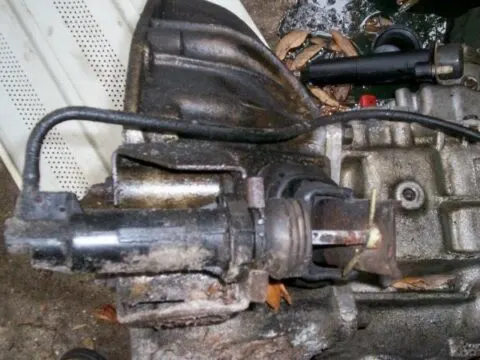A multi-plate hydraulic clutch in Ford F150 replaces an ordinary clutch with a working procedure of engagement and disengagement of the revolving shafts with the engine.
Its structural composition is the same as that of a traditional cable clutch except that the master and slave cylinder is near the pedal and lever of the clutch.
Ford F150 Hydraulic Clutch problems include the leakage of oil in two cylinders and clutch disk of the clutch. Low pressure and impure fluid in the hydraulic lines cause severe damage to the F150 multi-plate clutch system. In addition, contamination, worn-out clutch, and pressure plate cause this issue.
The proper assembly of cylinders, pressure plate, clutch disk, flywheel, release bearings, pilot bushing, and a release fork is necessary for the accurate functioning of the hydraulic clutch.
Leakage
The fluid leakage in the hydraulic clutch assembly is one of the main reasons the clutch cannot engage with the transmission.
Mostly, leakage takes place in the master cylinder present near the pedal in the Ford F150.
Its parts work in collaboration; fluid also leaks in the slave cylinder near its lever.
The leakage in cylinders results in the non-disengaging of the clutch with the transmission while the driver shifts the gears continuously during driving.
Leakage is due to the fragile firewall around the oil reservoir in the clutch construction, and the poor quality fluid is also a cause of non-functioning.
Sometimes, there is a contamination of the dirt and the debris running in the assembly, making the fluid unable to work correctly.
You must carefully observe the master cylinder, slave cylinder, and hydraulic piping for the oil leakage.
You can replace the master-slave cylinder, but it is good to replace the slave cylinder simultaneously for better results.
The need is to check that pressure of the fluid is normal and the firewall is not in bad condition to engage the transmission.
Hard Clutch
A hard clutch is a situation in which it cannot engage or disengage when you are driving the truck.
A worn-out pressure plate is a reason behind the hard clutch in the truck that brings a threatening position for the driver.
The air in the pipes of the hydraulic system is also a cause of this issue and creates difficulty for the fluid to lubricate the inside lining.
The bleeding, which removes air from the hydraulic lines, helps clear the air from the clutch assembly. It is easy to bleed hydraulic clutch in F150.
You have to inspect that there is no noise and overheating which are the symbols of the worn-out pressure plate.
Non-adjusted and Worn-Out clutch
The damaged linkage that connects the fork with the pressure plate has a connection with the disc plate resulting in non-engagement of the shafts.
This miss adjustment results in the wrong energy transmission from the fork to the other parts of the clutch assembly.
The broken motor mounts are severe problems and need proper checking.
Worn-out parts result in the smell coming from the engine and damage the hydraulic system in the pickup truck.
You must inspect those linkage bearings are at their place and adequately adjust the hydraulic system.
You have to check that there is no breakage and corrosion on the motor mounts, and also check that smell is not coming from the engine bay.
You can replace it with a new and better quality one of a reputed brand to have a perfect system for the truck.
Faulty seals and bearings
Sometimes, a growling noise comes when you keep your foot on the clutch pedal due to the loose release bearings.
The worn-out or damaged bearings result in difficulty shifting the gears, noise, oscillation in the pedal, and total clutch failure.
When you use it for a more extended period, the accidental damage affects the release bearings of the clutch in the F150 truck.
Damaged seal due to the contamination of oil, accidental effect, creates a problem for maintaining fluid pressure in the clutch.
You have to inspect that the bearings are tight and are away from any damage.
You have to check that no contaminated oil in the cylinders and hydraulic lines damage the device’s seal.
Clutch juddering
Clutch juddering is the non-efficient alignment of the flywheel with the other hydraulic clutch components in the Ford F150.
Contamination in the clutch is the cause of the juddering that makes the hydraulic system inappropriate to function.
It is a phenomenon that is more obvious when you start to lift off the vehicle after a complete stop.
It becomes visible when moisture is around the assembly, especially in the winter season’s cold nights.
Miss alignment and broken springs are why the juddering brings a safety hazard for the driver.
You have to align its assembly and ensure that the flywheel is properly with the other components.
Clutch slipping
Clutch slipping is the phenomenon when the truck is not moving, despite the clutch engagement and disengagement.
Overheating, contamination with the oil, wrong installation, and worn-out disc are a few reasons that cause this issue.
An impaired flywheel causes slipping, and it demands a careful replacement due to its location.
An annoying smell from the acceleration pedal is the symptom of the clutch slipping in the automatic vehicle with a hydraulic system.
You have to urgently replace the worn-out disc and impaired flywheel with utmost care.
Variation in clutch’s bite point
The damaged master and saver cylinder create a high bite point on the pedal of a clutch of the multi-plate clutch system.
A low bite point brings a faulty clutch release process, making the truck vulnerable during a long journey on the hills roads.
Bite point checking is necessary to inspect when you start your truck because it helps the wheels connect with the engine.
A higher bite point indicates that the device is worn out due to the fluid contamination inside the hydraulic lines.
The adjustment of the biting point is difficult because this system is challenging to adjust.
Keeping the bite point to an average level for the proper functioning of the hydraulic clutch in the truck is helpful.
To have a safe and sound journey on bumpy roads, you must replace it with a new and better-quality one.
Related Articles:
Tips to replace fan clutch in F150
F150 Electronic Locking Differential Problems
Where is the Thermostat on a Ford F150?

